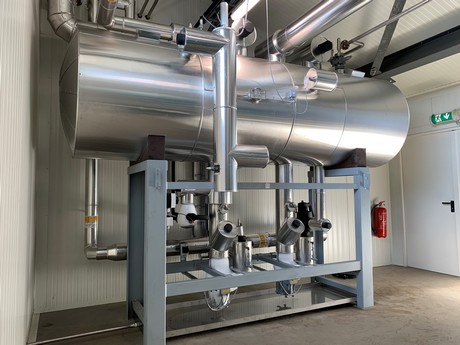In recent years, the F-gas regulations have been a topic much talked about in the cooling sector. On 1 January 2015, this phasing out process was started, and its final goal is a reduction of 79 per cent of the total emission of greenhouse gases in 2030. The installations for cooling fresh produce usually work based on synthetic coolants such as R404A and R134a. “These coolants aren’t poisonous or flammable and contain beneficial characteristics, cooling-wise, but they still contribute to the greenhouse effect when released into nature,” says Ronald van den Bergh of Govers Koeltechniek. “Up to 2030, the amount of available coolants will be reduced. The consequences of the restrictions are becoming more and more noticeable. The market for coolants is becoming under pressure, which results in rapid price rises and a limited availability. Particularly R404A, with a GWP of 3,922, is under pressure. The price of coolants has risen sharply in recent months.”
The phasing out of synthetic coolants requires action. More and more companies decide to alter or revise their existing installation or to purchase a new installation that uses natural coolants. A short-term solution is filling the installation with a drop-in coolant. Ronald: “This is an option for installations that don’t have to be around much longer, but it’s still only an emergency solution. Drop-in coolants are suitable for storing packed products or cooling processing halls, among other things. To use it in fruit cold stores, the disadvantages of the drop-in coolant have to be carefully considered. Switching to an installation that uses natural coolants is always a good and future-proof alternative.”
Be on time!
Yet the investment is still a bridge too far for many users. Ronald: “The installations for natural means are expensive. Arrangements can be made, but not everyone can make use of these. If it were up to us, it would be made more appealing to switch. That would prevent everyone taking action at the same time.” The Project Engineer is mostly talking about the ban on filling the installations with R404A, which will be in effect as of 1 January 2020. Cooling installations can then only be topped up with regenerated, or recycled, coolant. “Regenerated coolants are already scarce, and we therefore don’t expect a lot of coolant to be released anymore. A serious shortage of coolant is therefore imminent. Users that get leaks will be in trouble, and not just because of the high prices. The big question is whether plenty of coolant will be available in the first place.”
According to Ronald, the time for waiting is over. Informing and advising customers is an important job for them, as suppliers of cooling installations. “For users of fruit installations, the 2020 deadline means that their installation will have to be altered before the next storage season starts in 2019. Because of the expected busyness for cooling installers, it’s important to get started with this on time. Talk to your installer and look at the options together to decide which solution best fits your company, now and in future.”

Larger cooling capacity requires robust installation
Ammonia, CO2 and Propane are suitable natural coolants for cooling fruit and vegetables. Companies with a large cooling capacity often choose a cooling installation with ammonia as coolant because of the heavy and robust realisation. Ammonia as coolant is well-known because of its good cooling properties. However, the substance is flammable and even poisonous in higher concentrations. “To guarantee safety, these installations have to meet guidelines and regulations. This isn’t cheap. Nevertheless, ammonia is an exceptionally good natural coolant,” says Ronald. “An additional advantage is that this environmentally friendly cooling installation saves even more energy, so that these additional costs can be earned back over time. Moreover, it’s generally well-known that storage results with ammonia installations are better than with freon installations.”
Govers Koeltechniek recently installed a complete, new cooling installation with ammonia as coolant for Van Rossum Fruit in Stavenisse, the Netherlands. Not just their own apples and pears are stored in gas-proof storage cells. Van Rossum Fruit also refrigerates for third parties. With the construction of a new warehouse, the total now amounts to 40 cooling cells that can store 6.5 million kilograms of apples and pears.
“When we started here, they already had two large storage halls with cooling cells. A third warehouse was built, which holds seven cooling cells. A freon installation is still installed in the oldest warehouse , but the second-oldest already has an ammonia installation,” Ronald explains. Considering the size of the company and the existing installation, Van Rossum Fruit once again chose ammonia as a coolant. “It’s the best option for them to be able to continue to guarantee year-round quality. Because Van Rossum also refrigerates for others, it’s important to have an advanced installation that will last years for the company.” In addition, there’s the possibility to link the hall holding the freon installation to the new cooling system in future, so that all cooling cells can be cooled with ammonia.







